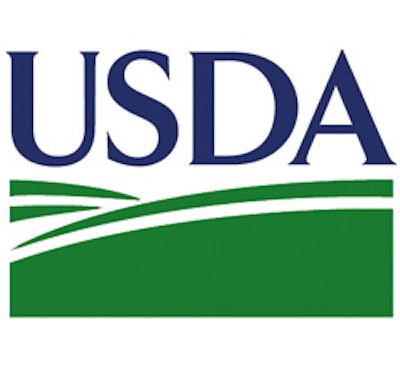
OMAHA, Neb. (USDA) — Speaking at the opening session of the first of four regional workshops to outline resources available to assist with drought recovery efforts, Agriculture Secretary Tom Vilsack said the lack of a new five-year Food, Farm and Jobs Bill has the potential to delay and stifle the federal response.
"USDA is doing all we can, but key programs traditionally made available in times of disaster are in limbo because Congress has allowed our authority to deliver them to expire," said Vilsack. "As I travel the country, it is clear to me that farmers and ranchers are aware of the gravity of the situation, and the need for Congress to act."
Vilsack indicated that President Obama had directed federal agencies to take every possible step to help farmers and ranchers, businesses, and rural communities recover as a result of one of the country's worst droughts in decades. USDA is partnering with local, state and federal partners to hold the workshops, working closely with the Department of Commerce, the Small Business Administration and the Federal Emergency Management Agency to facilitate these meetings.
"The U.S. Commerce Department's Economic Development Administration, with its decades of experience helping regions stricken by natural disasters, will play an important role in this multiagency Obama administration effort to partner with the farmers, ranchers, small businesses, and rural areas that have been impacted by the droughts to help get them on a path to economic recovery," said Matt Erskine, Acting Assistant Secretary of Commerce for Economic Development. "The regional drought recovery meetings are timely and offer a great opportunity to provide detailed information on existing federal resources to support local initiatives and identify strategies for long-term solutions."
Today's workshop was sponsored by the University of Nebraska-Lincoln Extension, the National Association of Counties, and the Mayor of Omaha. Among the federal officials joining Secretary Vilsack at the session was Thomas Guevara, Deputy Assistant Secretary for Regional Affairs at the Economic Development Administration.
The next meeting will be at the Colorado State Fairgrounds in Pueblo on October 15th to be followed by meetings in Pine Bluff, Arkansas on October 17th and in Ohio during the week of October 22nd.
At the direction of the President, Secretary Vilsack is helping coordinate an Administration-wide response that has included: the National Credit Union Administration's increased capacity for lending to customers including farmers; the U.S. Department of Transportation's emergency waivers for federal truck weight regulations and hours of service requirements to get help to drought-stricken communities; increased outreach and emergency lending by the Small Business Administration; and more.
(You can view a White House fact sheet outlining efforts by non-USDA Federal agencies here.)
As of Oct. 2, 2012, USDA has designated all or parts of 39 states as natural disaster areas this year. USDA continues to encourage any farmer or rancher with questions to contact a USDA Service Center office, because even with limited legal authority, USDA has worked hard to offer tools to help.
The Obama Administration, with Agriculture Secretary Vilsack's leadership, has worked tirelessly to strengthen rural America, maintain a strong farm safety net, and create opportunities for America's farmers and ranchers. U.S. agriculture is currently experiencing one of its most productive periods in American history thanks to the productivity, resiliency, and resourcefulness of our producers. A strong farm safety net is important to sustain the success of American agriculture. USDA's crop insurance program currently insures 264 million acres, 1.14 million policies, and $110 billion worth of liability on about 500,000 farms. In response to tighter financial markets, USDA has expanded the availability of farm credit, helping struggling farmers refinance loans. Since 2009, USDA has provided more than 128,000 loans to family farmers totaling more than $18 billion. Over 50 percent of the loans went to beginning and socially disadvantaged farmers and ranchers.
#
USDA is an equal opportunity provider and employer. To file a complaint of discrimination, write to USDA, Assistant Secretary for Civil Rights, Office of the Assistant Secretary for Civil Rights, 1400 Independence Avenue, S.W., Stop 9410, Washington, DC 20250-9410, or call toll-free at (866) 632-9992 (English) or (800) 877-8339 (TDD) or (866) 377-8642 (English Federal-relay) or (800) 845-6136 (Spanish Federal-relay).






















